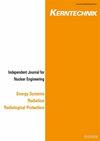Analysis of 4-inch cold leg top-slot break LOCA in ATLAS experimental facility using MARS-KS
IF 0.4
4区 工程技术
Q4 NUCLEAR SCIENCE & TECHNOLOGY
引用次数: 0
Abstract
Abstract Korea Atomic Energy Research Institute (KAERI) has operated an integral effect test facility, the Advanced Thermal-Hydraulic Test Loop for Accident Simulation (ATLAS) with reference to the Advanced Power Reactor 1400 MW (APR1400) for transient and design basis accidents (DBAs) simulation. An experiment for a 4-inch cold leg top-slot break was performed at ATLAS to resolve a safety issue that the loop seal reformation (LSR) of APR1400 could lead to the increase of peak cladding temperature. In addition, the experimental data has been utilized to validate system codes within a framework of domestic standard problem (DSP) program organized by KAERI in collaboration with Korea Institute of Nuclear Safety (KINS). In this study, the experiment has been analyzed by thermal-hydraulic system analysis code, MARS-KS 1.5 and a comparison with experimental and calculation results has been performed. Since the top-slot break is not a typical break geometry for safety analyses, this study aims at examining the applicability of MARS-KS to the top-slot break accident where the LSR occurs repeatedly. The results revealed that overall physical behavior during the accident was predicted by the code, appropriately. MARS-KS showed the excursion of the peak cladding temperature because of the LSR as in experiment. It has been confirmed that the core integrity was maintained because the temperature excursion by the LSR was not large enough to alter the acceptance criteria. In addition, it is presented the results of the sensitivity analysis of parameter that affect the figure of merits.利用MARS-KS分析ATLAS实验装置4英寸冷腿顶槽断裂LOCA
韩国原子能研究所(KAERI)参照先进动力堆1400 MW (APR1400)运行了一个用于瞬态和设计基础事故(DBAs)模拟的综合效应试验设施——事故模拟先进热液试验回路(ATLAS)。为了解决APR1400循环密封改造(LSR)可能导致包层峰值温度升高的安全问题,在ATLAS上进行了4英寸冷支腿顶槽断裂实验。此外,在KAERI与韩国核安全研究所(KINS)合作组织的国内标准问题(DSP)计划框架内,实验数据已被用于验证系统代码。本研究采用热液系统分析程序MARS-KS 1.5对实验进行分析,并与实验和计算结果进行对比。由于顶槽断裂并不是安全分析中典型的断裂几何形状,因此本研究旨在检验MARS-KS在反复发生LSR的顶槽断裂事故中的适用性。结果显示,事故期间的整体物理行为是由代码预测的,适当的。在实验中,由于LSR的存在,MARS-KS出现了包层温度峰值偏移。经证实,由于LSR的温度偏移不足以改变验收标准,因此保持了堆芯的完整性。此外,还给出了影响优值的参数的灵敏度分析结果。
本文章由计算机程序翻译,如有差异,请以英文原文为准。
求助全文
约1分钟内获得全文
求助全文
来源期刊

Kerntechnik
工程技术-核科学技术
CiteScore
0.90
自引率
20.00%
发文量
72
审稿时长
6-12 weeks
期刊介绍:
Kerntechnik is an independent journal for nuclear engineering (including design, operation, safety and economics of nuclear power stations, research reactors and simulators), energy systems, radiation (ionizing radiation in industry, medicine and research) and radiological protection (biological effects of ionizing radiation, the system of protection for occupational, medical and public exposures, the assessment of doses, operational protection and safety programs, management of radioactive wastes, decommissioning and regulatory requirements).
 求助内容:
求助内容: 应助结果提醒方式:
应助结果提醒方式:


